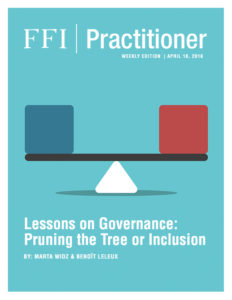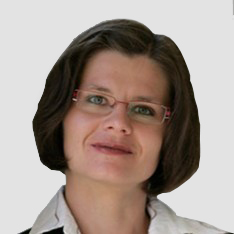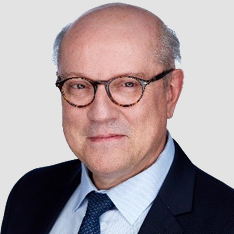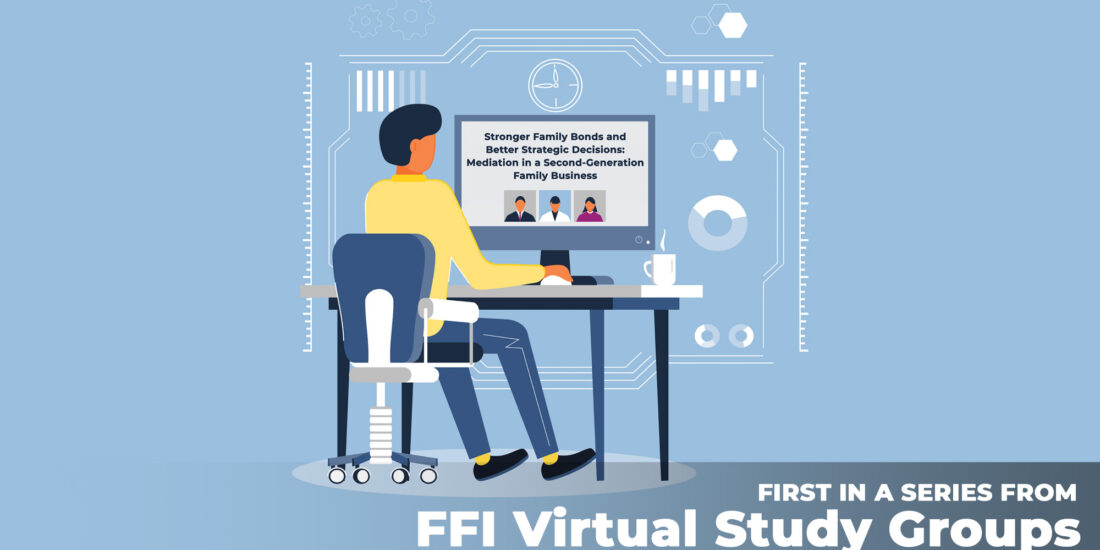
View this edition in our enhanced digital edition format with supporting visual insight and information.
For family businesses, there is no one-size-fits-all approach to governance and advisers need to understand each family’s unique values and ownership philosophies before attempting to implement specific governance structures. Thanks to Marta Widz and Benoît Leleux from IMD for illustrating this point by sharing two cases where the family businesses have divergent ownership philosophies but have both excelled in their governance practices.
In 2016 and 2013 respectively, these two remarkable family businesses were recognized by IMD for their exceptional commitment to sustainability, corporate social responsibility, innovation and market leadership as well as their distinctive governance principles. On that last front, while both excelled in their own ways, they also diverged radically in their ownership philosophies.
In this edition of FFI Practitioner, we compare the two philosophies and what they entail in terms of structures and processes. The first, referred to as “pruning the tree”, relies on extremely concentrated ownership to ensure the continuity of the family business. The second, referred to as “inclusion”, values broad family affiliation and ownership as the basis for family business sustainability. These two approaches should be considered as extremes in a continuum, with ample space in-between for hybrid models. As philosophies, they are equally valid but translate into very different governance requirements to excel.
One Captain – One Ship: Pruning the Tree at Jebsen & Jessen Family Enterprise
Two families – the Jebsens and the Jessens – always stayed in full control of their joint destiny through a strong wish to also stay private and financially independent.1
To stay nimble and entrepreneurial, the ownership has always remained concentrated in very few hands; through the concept of “principal shareholders,” each family would normally be represented by a single member. Based on the “one captain – one ship” mentality inherited from their sea-faring days, Hans Michael Jebsen is the principal shareholder in Jebsen & Co. and Heinrich Jessen the principal shareholder in Jebsen & Jessen (SEA). For the other corporate entities, they apply a “hand in glove” leadership, with equal cross-shareholdings and a consensus-based decision making, facilitated by the small number of shareholders. Each is thus a majority shareholder in one entity, a minority or equal shareholder in others, forcing them to assume all possible ownership roles in turn.
The principal shareholder in a generation in each family selects its successor, an individual who has to work in the firm and be vetted by the family. The successor would not inherit the shares, but instead would acquire them from his or her predecessors, sometimes taking decades to pay the predecessor off. It took Heinrich Jessen – the third generation principal shareholder from Jessen family – 15 years to pay off his shares with dividends that came and required his full commitment to the business.
Principal family shareholders are also willing to temporarily extend ownership beyond family members to key managing directors, who upon retirement would sell the shares back to them, guaranteeing the sustainability of the family ownership. This rule is inherited also from ancestors who, as ship captains not only navigated the ships, but also – according to time-tested rules – often had to own part of the loads they transported to align their interest with those of their cargo clients.
Such governance rules reinforced a strong “business first” principle, reflected also in the low dividend appetite of the shareholders, who are fully aware that corporate wealth does not equal private wealth.
A Family of Solutions: Inclusion at J.M. Huber Corporation
The corporate slogan, “J.M. Huber, A Family of Solutions,” was introduced in the mid-1990s to reflect the organization’s family ownership, entrepreneurial roots and innovative thinking. For owners, Huber family members, the business is part of their identity, and the Huber family stands out for its particularly inclusive nature. Family members are free to pass on ownership stakes to their children and spouses, which brought the number of shareholders from the fourth, fifth, and sixth generations to over 220 by 2018.2
Designed as a key pillar of family unity, the Huber family’s Annual Meeting Weekend brings together more than 100 people who participate in team-building activities, learn from product demonstrations by employees and attend the Annual Meeting of Shareholders. Fostering a shared sense of commitment and purpose at J.M. Huber is based on extensive information sharing. The Shareholder Communications Team oversees the whole communication menu, which includes the Huber Board Insights, a 10–12 page newsletter sent to all shareholders after each board meeting; and the NextGen Connection newsletter, designed to keep members of the Huber family informed, educated and connected, which also provides news from the company and its leaders. In the 80s “Family Director Training Programs” and the “Huber University” were established to educate Huber family owners on the company’s history and heritage and ultimately train them to assume various roles within the companies, boards and family.
But joining the boards and operational roles is not given to any family members. They are assessed in a stringent merit-based process and have to prove they are “invested, committed, and engaged.” Further, the family member employment guidelines emphasize experience and skills before a family member would even be considered for an internal position. Finally, fresh family members on boards traditionally start out as “non-voting directors” – attending all meetings and treated as full board members with the duty to contribute but without the right to vote.
Huber family members recognize a delicate balance needed to be found between their corporate and family governance structures, separated but still smoothly coordinated. On the corporate side, it is one share one vote, with larger shareholders wielding more power. But on the Huber Family Council, it is one member, one vote… and each member is equal.
Ownership Philosophies and Governance Models: Tailor-Made to Fit!
The governance models of Jebsen & Jessen Family Enterprise and J.M. Huber are both rooted in deep family values and legacies. Over time, they have evolved in very different directions to fit the evolving philosophies of the respective families. This is not a one-size-fits-all world: there is no single governance model that can be applied to all families effectively.
As advisers, you need to understand the underlying values and ownership philosophies of your family business client to effectively chaperon them to tailor-fit an effective governance model to their private needs. In a way, you need to become the Savile Road of governance models, designing and adjusting the bespoke garment that will fit the family, the business, and the owners.
1Leleux, B., Widz, M. (2017) Jebsen & Jessen Family Enterprise: Masters of Entrepreneurial Partnerships. Tomorrow’s Challenges : IMD.
2See also “J.M. Huber: A Family of Solutions” by Anne-Catrin Glemser and Benoît Leleux, IMD-3-2417, 2015.
About the family companies
In 2016 the IMD Global Family Business Award was vested on Hans Michael Jebsen and Heinrich Jessen, the two principal shareholders of Jebsen & Jessen Family Enterprise. Each belongs to the third generation of their respective families originating from Aabenraa in modern-day Denmark, families who entered into an original and very entrepreneurial partnership back in 1895 to establish a trading house in Hong Kong, following an even longer tradition as intrepid ship captains.
For the last 120 years, Jebsen & Jessen Family Enterprise has connected East and West, evolving into a highly diversified federation of businesses, spanning distribution, manufacturing, engineering, and mining activities. Organized around six main business entities, Jebsen Group, Jebsen & Jessen South East Asia, Jebsen & Jessen Hamburg, GMA Garnet Group, and two other smaller entities, Jebsen & Jessen Family Enterprise employed over 7,100 people worldwide and generated more than US $3.8 billion in sales in 2017.
In 2013 the IMD Global Family Business Award went to the J.M. Huber Corporation. The history of J.M. Huber Corporation dates back to 1883, when Joseph Maria Huber left Germany for America to develop new markets for the Michael Huber München Farbenfabriken – and went on to found his own dry-color business in 1883 in Brooklyn, New York. Still 100% family-owned 135 years later, J.M. Huber has grown into an international portfolio of businesses focused on specialty engineered materials. It is now in its sixth generation, bringing total family membership to over 220. One of the largest and oldest family-held companies in the US, the firm has headquarters in Edison, New Jersey, and is a true global player with operations in more than 20 countries and about half of its 4,000 employees based outside North America. A portfolio management company (PMC), Huber has become one of the key players in hydrocolloids, specialty chemicals and minerals, and engineered woods, and in 2017 booked sales of USD $2.3 billion.
About the contributors
 Marta Widz is a researcher at the Global Family Business Center at IMD and a project manager for the IMD Global Family Business Award. She obtained her PhD at the Center for Family Business at the University of St. Gallen (CFB-HSG), Switzerland. She is a specialist in corporate governance of family firms, family governance, and entrepreneurship in family business. Marta can be reached at marta.widz@imd.org.
Marta Widz is a researcher at the Global Family Business Center at IMD and a project manager for the IMD Global Family Business Award. She obtained her PhD at the Center for Family Business at the University of St. Gallen (CFB-HSG), Switzerland. She is a specialist in corporate governance of family firms, family governance, and entrepreneurship in family business. Marta can be reached at marta.widz@imd.org.
 Benoît Leleux is the Stephan Schmidheiny Professor of Entrepreneurship and Finance at IMD since 1999 and the Director of the IMD Global Family Business Award since 2008. He was previously Visiting Professor of Entrepreneurship at INSEAD and Associate Professor and Zubillaga Chair in Finance and Entrepreneurship at Babson College, Wellesley, MA (USA) from 1994 to 1999. He is a specialist in entrepreneurship, venture capital, private equity and corporate venturing, with a strong interest in family business. Benoît can be reached at benoit.leleux@imd.org.
Benoît Leleux is the Stephan Schmidheiny Professor of Entrepreneurship and Finance at IMD since 1999 and the Director of the IMD Global Family Business Award since 2008. He was previously Visiting Professor of Entrepreneurship at INSEAD and Associate Professor and Zubillaga Chair in Finance and Entrepreneurship at Babson College, Wellesley, MA (USA) from 1994 to 1999. He is a specialist in entrepreneurship, venture capital, private equity and corporate venturing, with a strong interest in family business. Benoît can be reached at benoit.leleux@imd.org.

View this edition in our enhanced digital edition format with supporting visual insight and information.





